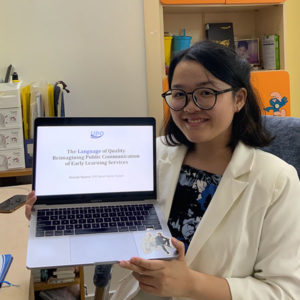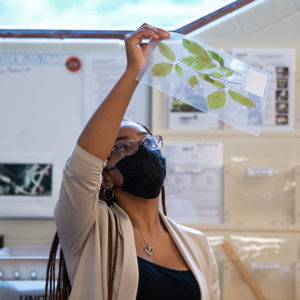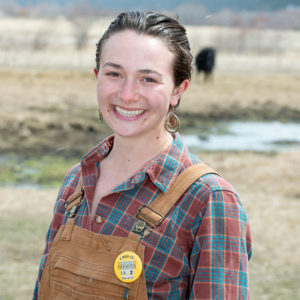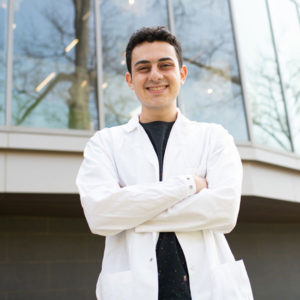Connected Learning – a great springboard to life and work
Because we help connect what you learn in your major and across disciplines with opportunities on campus, in the local community, and around the world, you’ll be able to explore both your intellectual passions and career aspirations.
Check out some of the hands-on learning opportunities students had and how it enhanced their educational experience.
 Through her APEX Fellowship at the United Planning Organization, Hannah, an international student from Vietnam majoring in communication studies, explored her interests in education policy. She discovered the opportunity through the Shepherd Higher Education Consortium on Poverty (SHECP) organization. In her role, she conducted research on racial inequalities in access to early education services in Washington, D.C., to then strategize for the organization.
Through her APEX Fellowship at the United Planning Organization, Hannah, an international student from Vietnam majoring in communication studies, explored her interests in education policy. She discovered the opportunity through the Shepherd Higher Education Consortium on Poverty (SHECP) organization. In her role, she conducted research on racial inequalities in access to early education services in Washington, D.C., to then strategize for the organization.
“Because my APEX Fellowship was through the SHECP program, it helped me learn about social justice and poverty, both academically and experientially. I did a lot of reading, looked up articles and policy briefs, and emailed people back and forth to set up interview times. I was able to experiment with different research methods, and it was so interesting seeing the difference between research as a student versus research demanded by an organization.”
 Chamari, a neuroscience major, participated in a community water project to establish a data collection and monitoring system to help deal with excess stormwater runoff in Northeast Ohio the summer before her sophomore year. The eight-week summer project was one of 12 Applied Methods and Research Experience (AMRE) projects conducted where students team with faculty advisors, local businesses, and organizations, to apply their education to real-world problems, in this case, climate change. Students learned a multitude of technical skills in geographic informations system mapping, software programming, and field techniques such as coring trees, analyzing tree rings, dendrochronology, along with measuring stream profiles and soil depth. They also became more adept at nontechnical skills such as communication, writing, and leadership. Chamari, who had no previous experience in climate science, found new interest through the experience.
Chamari, a neuroscience major, participated in a community water project to establish a data collection and monitoring system to help deal with excess stormwater runoff in Northeast Ohio the summer before her sophomore year. The eight-week summer project was one of 12 Applied Methods and Research Experience (AMRE) projects conducted where students team with faculty advisors, local businesses, and organizations, to apply their education to real-world problems, in this case, climate change. Students learned a multitude of technical skills in geographic informations system mapping, software programming, and field techniques such as coring trees, analyzing tree rings, dendrochronology, along with measuring stream profiles and soil depth. They also became more adept at nontechnical skills such as communication, writing, and leadership. Chamari, who had no previous experience in climate science, found new interest through the experience.
“I wanted to explore nature while finding ways to improve natural habitats in the Wooster community. I gained long-lasting relationships with my peers, mentors, and advisors.”
New optional opportunities allow students to bring together academic interests, hands-on experiences, and career exploration for credit.
 Mike uses player statistics and data generated by coaches, the NFL, and third-party vendors to assist Head Coach Andy Reid and the Kansas City Chiefs coaching staff in preparing the team to succeed on the field.
Mike uses player statistics and data generated by coaches, the NFL, and third-party vendors to assist Head Coach Andy Reid and the Kansas City Chiefs coaching staff in preparing the team to succeed on the field.
Majoring in business economics at Wooster, Mike interned with alumnus Phil Shaffer ’78, who managed several large endowments and clients with high net worth. He later took an internship through the Great Lakes Colleges Association and The Philadelphia Center with Joe Banner, then-president of the Philadelphia Eagles. The internship led to a full-time position in research and development. “Internships are an opportunity to try things and take a test drive with a career you think you may be interested in, that was certainly instrumental for me,” he said.
One of the challenges Mike faces is breaking down the information he finds and creating a way to visualize it, something his experience at Wooster helped prepare him for. “The writing skills that you begin to develop in first-year seminar and are a part of so many of the classes are important for me in terms of creating reports,” said Mike. “I have to find a way to communicate my research concisely, accurately, and in a way that allows that information to be digested by the decision makers. That was a big part of what I took away from the interdisciplinary classes.”
 Jade works with 100 active archeological sites at the National Park Service’s Tonto National Monument in Arizona. She cleans and identifies artifacts, confirms that projects comply with various laws, does research, and hikes the backcountry to assess the condition of the two ancient cliff dwellings open to the public.
Jade works with 100 active archeological sites at the National Park Service’s Tonto National Monument in Arizona. She cleans and identifies artifacts, confirms that projects comply with various laws, does research, and hikes the backcountry to assess the condition of the two ancient cliff dwellings open to the public.
As an archeology major with a minor in classical studies at Wooster, Jade had firsthand experience working with collections and archives in Andrews Library. As she searched for graduate programs, a faculty member connected her with an alumna who worked for the National Park Service. After talking with the alumna, Jade saw a clear pathway to becoming an archeologist. She credits the connections she made at Wooster and the College’s emphasis on taking an interdisciplinary approach as keys to her success.
“I work on an interdisciplinary team daily. At Tonto, I work with interpretation staff, a natural resource specialist, and a facilities manager. I communicate regularly with people outside of my park, including experts in the regional office, tribal partners, and museum collection curators and archivists. The diverse range of courses available to me while at Wooster solidified the skills I’ve needed to collaborate with experts outside of my field,” she said.
Independent Study, known to generations simply as I.S., is the centerpiece of Wooster’s commitment to mentored research and a badge of distinction for all our graduates as they head into the world of work.
Check out how I.S. helped prepare some recent graduates for the next steps in their journeys.
 Claire, environmental geoscience major, built scientific lab skills as a research assistant with Meagen Pollock, associate professor of Earth sciences, in her sophomore year while studying petrology and found her true passion in soil science. Professor Pollock worked with Claire to develop an I.S. research project around her interests. Her research analyzed soil samples from farms in Colorado, and she shared the results with the farmers allowing them to put together plans to build up soil health and raise healthy crops. After completing her I.S., Claire apprenticed at Cooper Creek Ranch in Helmville, Montana, where she helped to design and implement a hydrology plan that addresses the ranch’s water supply needs and studied how soil health influences animal feed.
Claire, environmental geoscience major, built scientific lab skills as a research assistant with Meagen Pollock, associate professor of Earth sciences, in her sophomore year while studying petrology and found her true passion in soil science. Professor Pollock worked with Claire to develop an I.S. research project around her interests. Her research analyzed soil samples from farms in Colorado, and she shared the results with the farmers allowing them to put together plans to build up soil health and raise healthy crops. After completing her I.S., Claire apprenticed at Cooper Creek Ranch in Helmville, Montana, where she helped to design and implement a hydrology plan that addresses the ranch’s water supply needs and studied how soil health influences animal feed.
“Soil science is an area of science where lots of different fields came together. Learning from the farmers about their practices and land use history placed my research results in context and allowed me to provide feedback for farmers about how to improve or change their soil health. Now, I’m putting the lessons of my I.S. to good use as I continue to develop my soil science knowledge in the context of my mentor’s practices, land, and animals.”
 Marcel, a neuroscience major, was awarded a five-year fellowship by the National Science Foundation that provides financial support for graduate students pursuing research-based master’s and doctoral degrees in STEM disciplines. The recent Wooster graduate is pursuing a doctorate in neuroscience at the University of Michigan and is considering a career in science communication.
Marcel, a neuroscience major, was awarded a five-year fellowship by the National Science Foundation that provides financial support for graduate students pursuing research-based master’s and doctoral degrees in STEM disciplines. The recent Wooster graduate is pursuing a doctorate in neuroscience at the University of Michigan and is considering a career in science communication.
“The collective support I received from faculty and staff at Wooster has helped mold me into who I am today,” said Marcel. “Being part of such a tight-knit community really helped me get comfortable asking questions to my professors to better engage with the material. There’s not a single moment where I felt like there wasn’t at least a few people rooting for me.”
Marcel is considering a career in science communication and credits the completion of his Independent Study for instilling confidence as he moved to the next stage of life. “Having gone through the I.S. process helped me refine my skills in setting realistic goals and feeling okay if I don’t reach them,” Marcel said. “Setbacks are common in life and in science and you have to learn to be resilient.”
